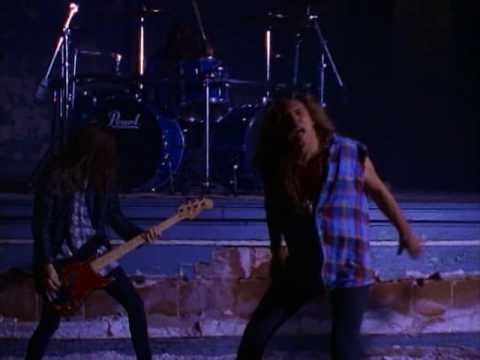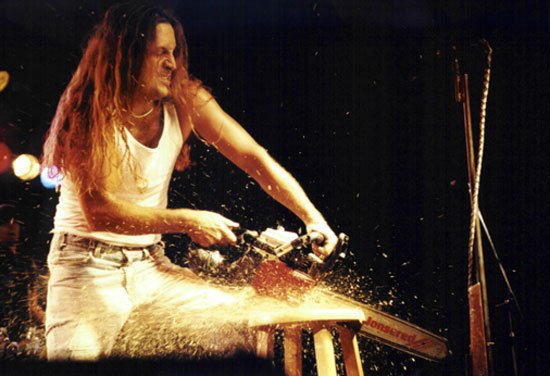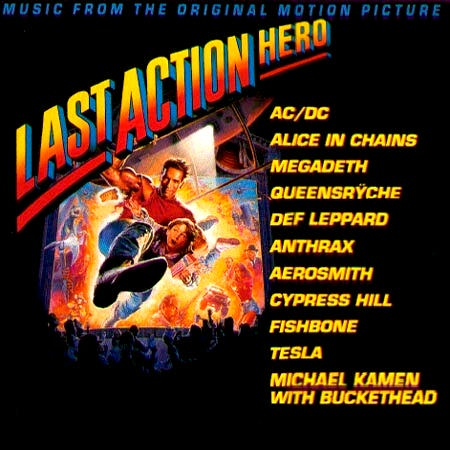Boo.
RETRORATING: 12
OFFICIAL
CONTEST WINNER!
- HOME
- YOUTUBE
- ARTICLES
- VIDEOS
- THEATER
- CLASSIFIEDS
- VHS COVERS
- CEREAL BOXES
- GAME BOX ART
- READ ALONGS
- PODCASTS
- FORUM
- FAQ
- POINTS STORE
Don't mess
with the bull.
JOIN!!!
The Great Hard Rock Harvest

But for every Goliath, there is a David. Starting with the phenomenal success of DIY grunge bands like Nirvana and Pearl Jam, by the mid-nineties, most hard rock had been forced off the radio and MTV, with album and tour sales plummeting. A number of glam bands were hit by other problems, such as greatly reduced label support and line-up changes. As alternative rock came to be the dominant form of rock music throughout much of the world, hard rock became increasingly looked upon as a relic of a more superficial, decadent era, and it has never truly its former popularity.
Before I go on, I would like to delineate what exactly do I mean by hard rock. As shown by the picture above, eighties-style glam metal is most definitely part of its definition, but I'll go somewhat beyond that. Hard rock can be considered many different things, but for my purposes, they generally:
a) Play songs that are usually about love, sex, partying, rough living, and occasionally larger societal issues; types of songs were generally fast and heavy or slow ballads, though there isn't always a clear line between the two, especially for seventies hard rock.
b) Often, though not always, the band members had long hair that was many times at least somewhat teased, dyed, or sprayed
c) Put an emphasis on showmanship and theatrics during music videos and live performances
d) Utilized intricate guitar solos in their songs; fast solos for rockers, slower solos for ballads
e) Went for a polished image that was often based on fashion and sex appeal; even when hard rock bands became "darker" in the early nineties, the band members often still promoted a pretty boy image
f) Used modern recording equipment to get the best sound, went for high-quality productions; often incorporated synthesizers and effects into their music
g) Clean guitar sound.
h) Later bands dabbled in acoustic ballads, but generally, power ballads were the type of slow songs they wrote and performed
i) Clean vocals, some of them heavily processed, but a few having a rougher (but still very mainstream-friendly) blues sound
I will also use the term "pop metal" a few times as well. Examples (a number of which will be mentioned several times in this article) are Motley Crue, Aerosmith, AC/DC, Rush, Def Leppard, Poison, Whitesnake, Green Jelly, RATT, Twisted Sister, Guns n' Roses, Led Zeppelin, Danger Danger, Rolling Stones, David Bowie, Ugly Kid Joe, Foreigner and...well, I think you get the picture. Seventies and eighties-style rock bands that VH1 loves to gush about, as well as a few oddballs that still fit the definitions that I listed above.
While many of them could technically be called hard rock, this article will not deal with:
a) Grunge (e.g. Nirvana, Pearl Jam, Mudhoney)
b) Post-grunge (e.g. Nickelback, Creed, 3 Doors Down)
c) Groove metal (e.g. Pantera, White Zombie, Lamb of God)
d) Thrash or heavy metal (e.g. Metallica, Megadeth, Slayer)
e) Pop punk (e.g. Green Day, Blink 182, The Offspring)
f) Alternative rock (e.g. Matchbox Twenty, Third Eye Blind, Dishwalla)
g) Nu-metal (e.g. Korn, Limp Bizkit, Papa Roach)
h) Funk metal/rock (e.g. Red Hot Chili Peppers, Incubus, Primus)
i) Alternative metal (e.g. Tool, Faith No More, Deftones)
j) Industrial (e.g. Nine Inch Nails, Rammstein, Front Line Assembly)
k) Any form of extreme metal or avant garde music in general
It's not that I don't like any of these bands and genres, it's just that for the purposes of this article, they are not what I am referring to when I say "hard rock."

Or at least, that's the media's version. The reality is a bit more complicated. While hard rock did whittle away in the public eye as the nineties progressed, it was not a one-way, predetermined path. Indeed, what we see in the early nineties is a harvest, where the hard rock wheat was separated from the chaff. While a good many bands did fall off the public radar, others rose to unprecedented stardom. And if one looks at the albums that were released in this period and the public reception to them, their success hinged not so much on trying to move with current trends. In fact, the most successful bands stayed distinct from the new alternative rock bands, maintaining the pop metal sound while improving on the overall quality of the music and sometimes moving in a more 'mature' direction.

In 1990, the hard rock scene was pretty much the same as it had been since bands like Van Halen, Motley Crue, Quiet Riot, and Def Leppard had kick-started the pop metal movement in the early 80s. The year saw the release of glam metal classics like Warrant's Cherry Pie, AC/DC's The Razor's Edge, Firehouse' self-titled album, and Poison's Flesh and Blood. In addition to this, some hard rock albums from the previous year remained popular, most notably Aerosmith's Pump and Motley Crue's Dr. Feelgood. There were some signs of changes in the music world; for example, metal bands began to increasingly eschew some of the more extreme elements of glam look, adopting a more staid look with non-dyed hair and street clothes. Also, with the growth in the popularity of thrash metal, a number of them began to play heavier music with darker lyrical themes. On top of that, Alice in Chains and Red Hot Chili Peppers, two bands that would later play a major role in defining the 90s music scene, were beginning to see some moderate success on the charts. But despite increasing label interest in alternative music, there was no evidence that the world of rock music was going to be turned upside down anytime soon.

Then of course came Nirvana's hit single, Smells Like Teen Spirit, which came to saturate pop culture and helped to open up a flood of alternative bands into the mainstream consciousness. On the metal side, bands like Metallica, White Zombie, Pantera, and Machine Head opened the world of groove metal to a new generation of metal fans. Caught between these two poles, many hard rock and pop metal bands found themselves floundering, leading to a number of them breaking in the following years or fading into obscurity. Today, when people think of nineties music, pop metal and arena rock are some of the last things to come to mind.

But for the bands that didn't crumble, it was something of a golden age. In 1992, Def Leppard released its fifth album, Adrenalize, which ended up selling over three million copies in the US alone and contained some of the band's biggest hits. Aerosmith's Get A Grip, released in 1993, sold over twenty million albums worldwide, becoming the band's best-selling album. Guns n' Roses scored big with their twin albums, Use Your Illusion I and II, together selling almost forty million copies worldwide, being part of a cross-promotional campaign with the blockbuster film Terminator 2: Judgment Day, and taking part in the wildly successful (and infamous) early nineties tour with Metallica. Van Halen's For Unlawful Carnal Knowledge and Balance, released in 1991 and 1995 respectively, both sold three million copies in the US. Their 1998 Van Halen III sold gold despite being considered the band's worst album ever. Bon Jovi, a band that is practically synonymous with the cheesiest eighties pop metal, continued to sell millions through the nineties, and had several big hit singles. There were other victories for hard rock during this period, such as Firehouse winning Favorite Heavy Metal/Hard Rock New Artist at the 1992 American music awards, beating out Alice In Chains and Nirvana.
Axel Rose faces off with the T-800 Terminator, played of course by Arnold Schwarzenegger in the music video for the song You Could Be Mine.
While older bands were building on their lucrative careers, some other hard rock bands made their name just at the time such music was reportedly "dying." Firehouse has already been mentioned. The singles from their first album charted throughout 1991. Their second album, Hold Your Fire, was certified gold and included several more hit singles. Another band that rose to fame at this time was Jackyl, a hard rock band that was famous for its lead singer playing a chainsaw solo during their song Lumberjack. One of the biggest hard rock bands of this time was Ugly Kid Joe, a band whose named parodied that of hair band Pretty Boy Floyd. Buoyed by the hit singles Everything About You and a cover of Harry Chapin's song Cat's In the Cradle, they went on to having the highest selling debut EP of all time.
 "I'm a lumberjack baby! I'm gonna cut you down to size!"
"I'm a lumberjack baby! I'm gonna cut you down to size!" Finally, there are the hard rock groups that I like to call the "monster bands." Traditional heavy metal and hard rock bands with bizarre, surreal, and/or disturbing lyrics and imagery that are different from traditional hard rock bands but still are within their musical continuum. One such band is GWAR, famous for their grotesque alien costumes, wild concerts, and gory/scatological filmed skits (e.g., pulling "Marilyn Manson" out of a toilet and skinning him alive). Another is Green Jello (forced to call themselves Green Jelly due to a lawsuit from the Jello company), who filmed dozens of psychedelic videos, wrote irreverent songs that mocked pop culture, and also wore strange costumes. Butthole Surfers, a psych rock band, had a moment in the sun when the video for their song Who Was In My Room Last Night was featured on the popular show Beavis and Butthead (indeed, Beavis and Butthead may be given alot of credit for keeping hard rock alive in the early nineties). Finally, stoner rock Monster Magnet must be mentioned. While the stoner movement of the nineties was largely an underground movement, this band scored a number of hits with songs like Space Lord and Negasonic Teenage Warhead. Clearly, hard rock of a different varieties remained popular.

How did this happen? How did some bands thrive while others collapsed? Some people like to blame Kurt Cobain as the man who "killed metal." This is an incredibly weak, absurd argument. While Cobain did publicly disparage metal, his contempt was mainly for hair bands only and their hedonistic lifestyles (a big force behind his feud with Axl Rose). He was a massive fan of Black Sabbath fan and cited The Melvins and White Zombie's EP God of Thunder as major musical influences. Also, most fans agree that two of the most successful grunge bands, Soundgarden and Alice in Chains, are metal bands.
No, what determined a hard rock band's fate was not what other bands were doing or saying. Instead, support from record labels was crucial in how much a band sold; lackluster promotion of singles and music videos (remember that this was MTV's heyday) doomed many albums. Possibly even more important than that was the actual music that the bands produced, and how well they were able to balance new trends with old. People were increasingly tired of derivative Sunset Strip hair metal, but the hard rock sound remained in demand, and most listeners were loath to see their favorite arena bands stretching to fit the stripped-down style of alternative bands.
On the winning side, successful bands did everything they needed to do in order to stay popular. Big-budget music videos (see the picture above), massive tours (e.g., Guns n' Roses/Metallica), and important media appearances (Aerosmith appearing on Saturday Night Live) kept these bands as keepers of the cool through promoting them as larger-than-life rock legends (and let's be honest, that's exactly what they were). Tying these bands to action movie soundtracks also helped their image, as mentioned before with the collaboration between Guns n' Roses and Terminator 2. Another great example of this was the soundtrack for the 1993 film Last Action Hero. This album showcased a number of hard rock artists, and generated several hits including AC/DC's Big Gun and Def Leppard's Two Steps Behind. Far from rejecting the image of the epic, masculine, big-haired rocker, these bands reveled in it to great success.

Now, let's look at the music itself. Far from rejecting the arena rock sound of the eighties, the big-selling hard rock acts of the early nineties merely built on it, improving their song-writing and album production quality. A perfect example of this can be seen is on Van Halen's For Unlawful Carnal Knowledge. Continuing with the sound that had made them one of the biggest rock acts of the previous decade, their hit single Right Now was just as polished as their earlier work. But instead of dealing with sex and partying, it's a mature ballad about seizing the moment and not letting your life pass you by. Bon Jovi scored big with their hit 1993 ballad Bed of Roses, and for much of the nineties, mostly put out ballads and serious-minded anthems as singles. Def Leppard's Adrenalize was just as pop and party oriented as the band's earlier material, but they too updated their image, utilizing computer graphics that were then state-of-the-art for their video of Let's Get Rocked. Their video for Stand Up and Kick Love Into Motion be filled with metaphorical skits and images, in fitting with the more artsy bent of rock at the time. And of course, there was Aerosmith, a band whose popularity peaked with their 1993 album Get A Grip. The lyrical content was a mixture of party songs and more introspective material, but it was the cinematic music videos for their songs Amazing and Crazy that brought them considerable critical acclaim. Once again, hard rock wasn't under threat of extinction, but rather, was evolving to meet elevated expectations while still keeping the sound and image that had made it popular in the first place.


Bands also hurt themselves by changing their styles. As seen in the success stories of groups like Aerosmith and Def Leppard, people still enjoyed the anthemic hard rock sound, just in an updated and more mature format. What fans did not want is for rock and metal bands to adopt a more minimalistic approach in a manner similar to that of grunge bands. In 1994, Queensryche released the album Promised Land, which was one of the band's best-selling albums despite coming out at a time when its progressive heavy metal style was not officially in vogue in the mainstream, proving that fans were still loyal to this style of music. But their 1997 release Hear in the Now Frontier had a more stripped down sound, alienating much of their fanbase. Poison's 1993 album Native Tongue largely ditched the upbeat hair metal sound in favor of a darker, bluesier sound. While the album did go gold, it too pushed away many longtime fans and led to the band declining in popularity. Even the mighty Def Leppard fell victim to this; their sixth album Slang had a noticeable grunge influence, and it did not go platinum.

Vaporman87 Posted on Sep 06, 2013 at 12:43 PM
This was a really great look back at the evolution of Hard Rock/Heavy Metal through the major transitions of the early 90's to today.
It is funny how some bands managed to stay on top throughout the years, while others just either could not adapt, or refused to.
Thanks to Venomous Mask for this!
Hey, you guys. A couple years ago, I published an article that featured five videos for retro inspired recipes. This year, I decided to do it again. S...
Star Wars had been nothing short of a franchise breakthrough in cinema with multi-million dollar box office sales, a wide range of merchandise and gar...
For many of us, Disney has been a big part of our childhood. Whether it's a particular movie, TV show, video game, comic, toy or song, we have all gro...
I think I speak for almost everyone when I say that we've spent a good chunk of our childhood in front of the TV. Whether it was playing our Super Nin...
Let's step back to a time when you didn't have control over what you watched. Streaming didn't exist. You watched what they decided when the...







